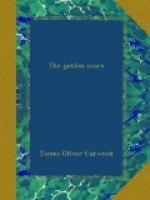So infinitesimal was the space of time between the throwing of the javelin and Philip’s movement that the Eskimo believed he had transfixed his victim. A scream of triumph rose in his throat. It was the Kogmollock sakootwow—the blood-cry, a single shriek that split the air for a mile. It died in another sort of cry. From where he had dropped Philip was up like a shot. His club swung through the air and before the amazed hooded creature could dart either to one side or the other it had fallen with crushing force. That one blow must have smashed his shoulder to a pulp. As the body lurched downward another blow caught the hooded head squarely and the beginning of a second cry ended in a sickening grunt. The force of the blow carried Philip half off his feet, and before he could recover himself two other figures had rushed upon him from out of the gloom. Their cries as they came at him were like the cries of beasts. Philip had no time to use his club. From his unbalanced position he flung himself upward and at the nearest of his enemies, saving himself from the upraised javelin by clinching. His fist shot out and caught the Eskimo squarely in the mouth. He struck again—and the javelin dropped from the Kogmollock’s hand. In that moment, every vein in his body pounding with the rage and excitement of battle, Philip let out a yell. The end of it was stifled by a pair of furry arms. His head snapped back—and he was down.
A thrill of horror shot through him. It was the one unconquerable fighting trick of the Eskimos—that neck hold. Caught from behind there was no escape from it. It was the age-old sasaki-wechikun, or sacrifice-hold, an inheritance that came down from father to son—the Arctic jiu-jitsu by which one Kogmollock holds the victim helpless while a second cuts out his heart. Flat on his back, with his head and shoulders bent under him, Philip lay still for a single instant. He heard the shrill command of the Eskimo over him—an exhortation for the other to hurry up with the knife. And then, even as he heard a grunting reply, his hand came in contact with the pocket which held Celie’s little revolver. He drew it quickly, cocked it under his back, and twisting his arm until the elbow-joint cracked, he fired. It was a chance shot. The powder-flash burned the murderous, thick-lipped face in the sealskin hood. There was no cry, no sound that Philip heard. But the arms relaxed about his neck. He rolled over and sprang to his feet. Three or four paces from him was the Eskimo he had struck, crawling toward him on his hands and knees, still dazed by the blows he had received. In the snow Philip saw his club. He picked it up and replaced the revolver in his pocket. A single blow as the groggy Eskimo staggered to his feet and the fight was over.
It had taken perhaps three or four minutes—no longer than that. His enemies lay in three dark and motionless heaps in the snow. Fate had played a strong hand with him. Almost by a miracle he had escaped and at least two of the Eskimos were dead.




